A school of 12-inch sharks were able to sink an inflatable 29-foot catamaran in the Coral Sea

Several small sharks about the size of a cigar are to blame for sinking a 29-foot catamaran this week sparking a dramatic night-time at-sea rescue, the vessel's survivors said.
Maritime authorities in Australia recued three sailors early Wednesday after officials said sharks attacked and sunk an inflatable catamaran in the Coral Sea.
The sailing party, two Russians and one French national, were safely pulled from the ocean while on their way to the northern Australian city of Cairnsfrom Vanuatu in the South Pacific, the Australian Maritime Safety Authority reported.
One of the rescued sailors, Russian Evgeny Kovalevsky, told The Guardian cookiecutter sharks are responsible for sinking the sailboat.
“[We were] not scared about our life. We [were] scared about the finishing of expedition,” he told the outlet, adding it was not the first time he'd come under attack by that species of shark.
Kovalevsky told the outlet he encountered them more than a decade ago in the Atlantic Ocean while, ironically, also on an inflatable vessel.
Watch the sailors get rescued after several sharks damaged their inflatable catamaran.

What is a cookiecutter shark?
The cookiecutter, according to the Shark Research Institute, measures an average of 12-19 inches in length and has thick lips and "razor sharp teeth" used to attach itself to prey leaving behind a crater-size wound.
Cookiecutter sharks generally live the oceanic ‘twilight zone ’ in depths to 3,300 feet (1,000 meters) and eat fish, squid, and crustaceans. They usually only surface from the deep at night, the research institute said.
Unlike other large sharks including great whites − known to reach lengths of 20 feet, the small cigar-shaped shark typically does not attack people in open water. However, they have been known to attack objects much larger than themselves like seals and even nuclear submarines, researchers with the institute said.
Sailors rescued after shark attack: Sailors rescued after several shark attacks damage inflatable catamaran in Coral Sea: Video
Two days of attack
In an Instagram post, the group wrote, the sharks first attacked the boat on Monday, leaving "the rear left ball" of the catamaran damaged.
"In an emergency state, the travelers lasted for about a day, they managed to travel about a hundred miles," the group wrote.
The next day, the group said, the ship was attacked again by sharks - this time causing the catamaran to lose its balance and begin to sink.
Crews said they issued an SOS and, about 45 minutes later, the catamaran was approached by a Panama-flagged passing container ship. At that point, the group reported, the captain decided to abandoned the sinking catamaran at sea.
Surfer attacked in Australia: Surfer attacked by suspected great white shark hospitalized, clinging to life
The sinking ship, a radio beacon and an at-sea rescue
An alert from a radio beacon on the catamaran led rescue crews to the vessel about 1:30 a.m. local time, maritime officials reported.
Rescue crews on a Cairns-based Challenger Rescue Aircraft , who confirmed the vessel was damaged from shark attacks, then rescued the three sailors and transported them to shore just outside Brisbane, Australia on Thursday, according to the group and maritime officials.
No injuries were reported.
Natalie Neysa Alund is a senior correspondent for USA TODAY. Reach her at [email protected] and follow her on X, the platform formerly known as Twitter @nataliealund.
Watch CBS News
3 sailors rescued after sharks attack and partially destroy their inflatable boat off Australian coast
Updated on: September 6, 2023 / 8:30 PM EDT / CBS/AP
Three sailors from Russia and France were rescued on Wednesday after the inflatable catamaran they were trying to navigate from Vanuatu to Australia came under attack from sharks, authorities said.
The Australian Maritime Safety Authority said it responded to an alert from an emergency beacon at about 1:30 a.m. When rescuers arrived at the scene more than 500 miles east of the Australian coast in the Coral Sea, they found both hulls of the men's 9-meter boat had been damaged after several shark attacks.
The agency enlisted the help of a Panamanian-flagged ship, the vehicle-carrying "Dugong Ace," which was able to complete the rescue and take the two Russians and one Frenchman aboard. A rescue plane also flew to the scene.
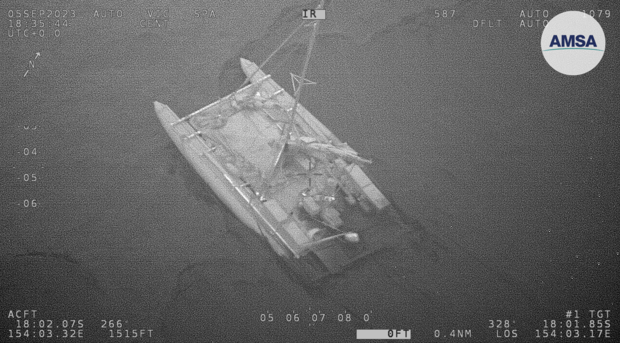
"The three males were very happy to be rescued, and they're all healthy and well," said Joe Zeller , duty manager at the agency's Canberra response center.
Footage shot by a rescue helicopter shows the catamaran bobbing in calm seas as it is approached by the hulking Dugong Ace.
The men, aged between 28 and 64, are due to arrive in the Australian city of Brisbane on Thursday.
Zeller said a journey from the Pacific Island nation of Vanuatu to Australia on such a vessel would usually take two to three weeks.
Aerial photos showed major damage to the catamaran, with the front section of one hull completely missing.
Zeller said the GPS-encoded emergency beacon had saved the men's lives by allowing rescuers to quickly pinpoint their location and mount an appropriate rescue.
"This is a timely reminder to always carry a distress beacon while on the water," the Australian Maritime Safety Authority said. "GPS-equipped EPIRBs and personal locater beacons (PLBs) can save your life in an emergency."
Zeller said there were many reasons why a shark may attack a boat.
"However, the motivations of these sharks is unclear," Zeller said.
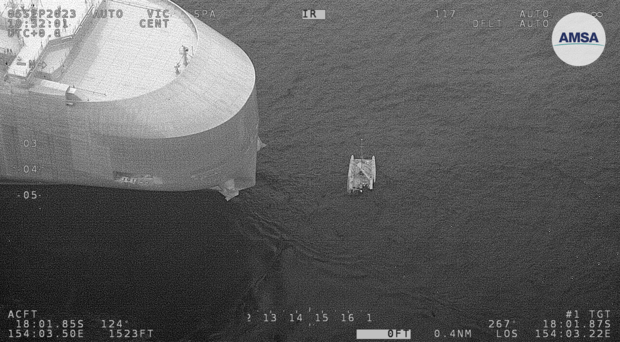
The Coral Sea is brimming with reef sharks and other apex species such as tuna and marlin.
According to the Australian government, it is home to more sharks "than almost any other survey site in the world."
Last year, three men whose fishing boat sank off the Louisiana coast were rescued "in the nick of time" by the U.S. Coast Guard after surviving for more than a day despite being attacked by sharks.
AFP contributed to this report.
- Shark Attack
More from CBS News
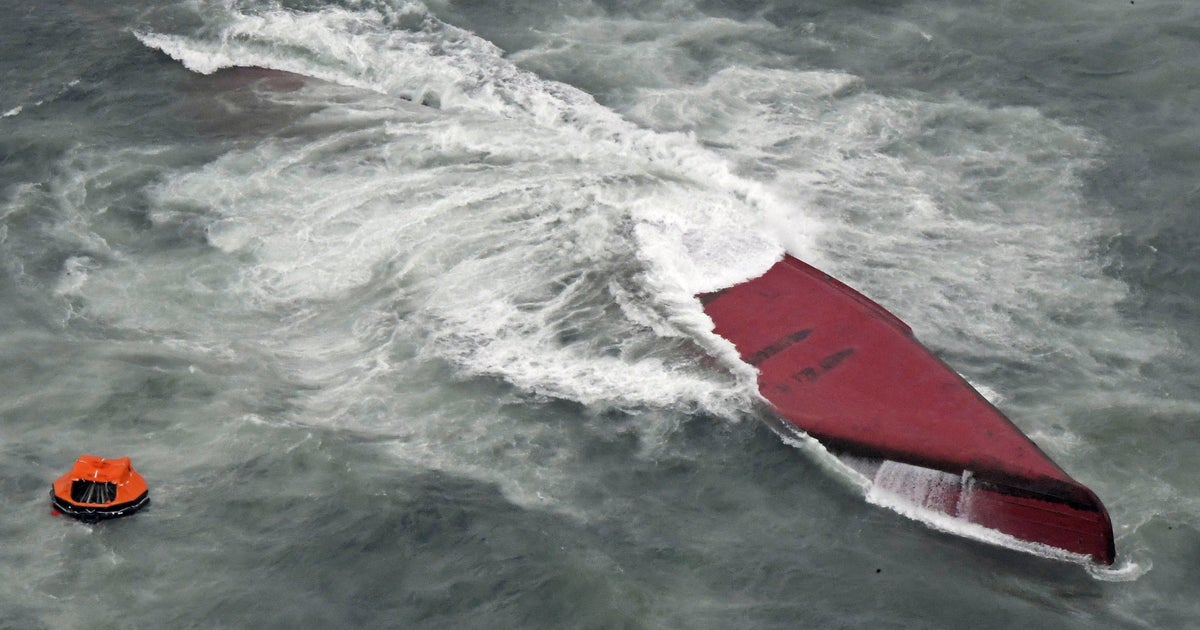
At least 8 killed as chemical tanker capsizes off Japan's coast
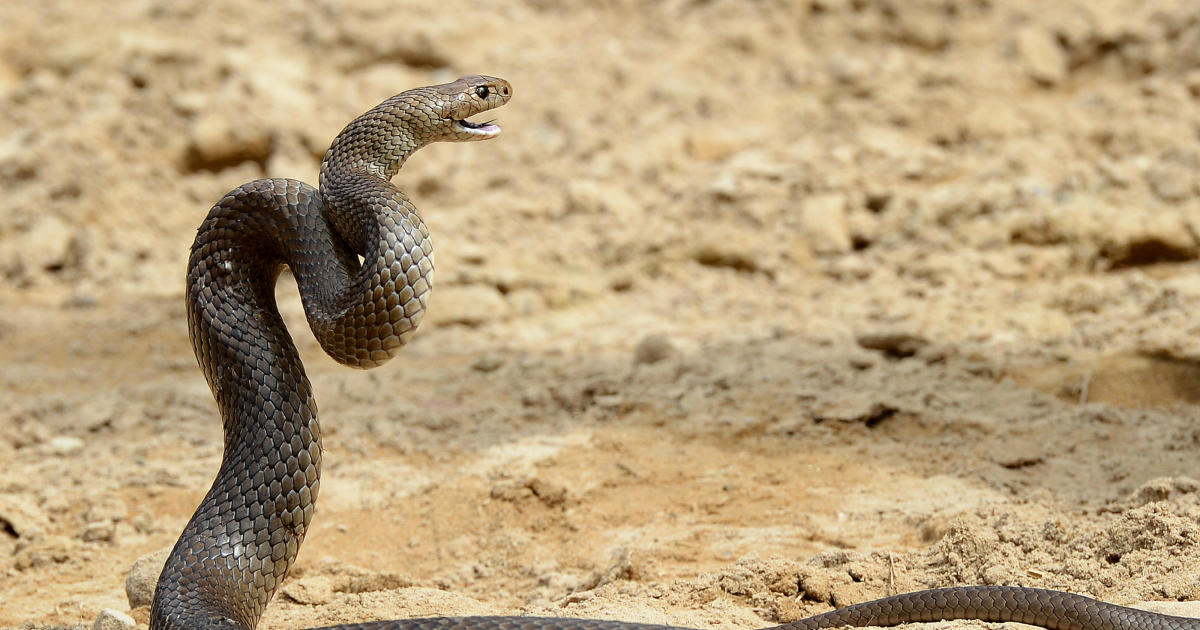
Man dies after being bitten by snake at child care center

Russia launches huge missile attack on Kyiv for first time in 6 weeks

For the first time, Russia admits it's "in a state of war" with Ukraine
Three sailors rescued from shark-bitten catamaran off Australia
Officials said sharks attacked the inflatable catamaran and tore off large chunks of the vessel’s hull.

Three men on board a catamaran off the northeastern coast of Australia have been rescued after sharks tore off sections from the hull of their inflatable vessel, according to officials.
The Australian Maritime Safety Authority (AMSA) said the three sailors – two Russian and one French citizen – were rescued early on Wednesday.
Keep reading
Ceo of australia’s embattled qantas steps down early, vanuatu’s new prime minister to ‘revisit’ australia security pact, vanuatu to elect new prime minister amid crisis over australia pact, australia to send more police to solomon islands, extend mission.
They were picked up by a Panama-flagged vehicle carrier – the Dugong Ace – while floating in the Coral Sea, some 835km (519 miles) southeast of Cairns in Australia.
Satellite photos and a video on the AMSA website showed a large part of the stern of the nine-metre (30-foot) yacht torn away.
“Both hulls of the vessel have been damaged following several shark attacks,” AMSA said in a statement.
The authority said the sailors, aged between 28 and 64, had planned to sail from the Pacific Island nation of Vanuatu to Cairns, a distance of more than 2,000km (1,200 miles). They activated an emergency distress beacon in the early hours of Wednesday morning.
The three sailors are due to arrive in Brisbane on Thursday, AMSA said.
“There’s many reasons why vessels are attacked by sharks. However, the motivations of these sharks are unclear,” said Joe Zeller, the acting manager of the AMSA Response Centre. The three sailors “were very happy to be rescued and they are all healthy and well and aboard the Dugong Ace,” he added.
The Coral Sea where the men were found is brimming with reef sharks.
According to the Australian government, it is home to more sharks “than almost any other survey site in the world”.
Sailors rescued from Coral Sea after sharks sank inflatable boat vow to continue voyage
The Russian and French crew of an inflatable catamaran sunk by sharks in the Coral Sea are thankful to have reached dry land after a dramatic rescue and several weeks at sea.
Key points:
- The three sailors from the Tion-Russian Ocean Way say they will continue their circumnavigation attempt
- They have now lost two boats since they left Russia in July 2021
- The sailors say they only recently learned of the danger of cookie-cutter sharks
The 9-metre Tion-Russian Ocean Way was deflated on Wednesday morning by cookie-cutter sharks during a Russian Geographical Society circumnavigation attempt to honour the country's great navigators.
The sailors were cleared by customs in Mooloolaba this morning.
Expeditioner Evgeny Kovalevskiy estimated "tens of sharks" were biting the boat before it was punctured.
The sponsons – the inflatable catamaran hulls — have four separate chambers inside to ensure the craft stays afloat if one or more is punctured.
"We see that air is less and less," Mr Kovalevskiy said.
The stern chambers on the port-side sponson were the first to deflate, rendering one of the two rudders useless.
"But when they attack the right balloon, it was finished — and we try to sink like the Titanic," Mr Kovalevskiy said
'You remember Titanic?'
The Australian Maritime Safety Authority coordinated a rescue early on Wednesday after the expeditioners set off an emergency beacon.
A passing car carrier, Dugong Ace, plucked the sailors from their stricken vessel.
"If the Panama cargo ship Dugong Ace would come later, maybe in two or three hours — you remember Titanic?" Mr Kovalevskiy said.
"So we could manage to get help and not die."
While they were waiting to be rescued, the crew collected important belongings, clothes, solar panels, batteries and generators, while trying to reinflate the sponsons.
"It's possible to keep floating more if you're pumping," Mr Kovalevskiy said.
"It was extremely unusual — we lost the boat.
"This is a catastrophic.
"We are still in great depression -- we're just shocked."
'Go home! Go home!'
Sailor Stanislav Berezkin said he was happy to be alive and back on dry land.
"I can only think about saving [our lives] -- I don't remember how I felt," he said.
"The cargo ship came very quickly.
"I think we were lucky."
Mr Berezkin spoke to his wife from the cargo ship.
"My wife told me, 'Go home! Go home!' and I say 'No, no, no we continue,'" he said.
French vineyard worker and traveller Vincent Bauge, who joined the team in Tahiti, was woken by Mr Berezkin when the boat started sinking.
"If you are nervous, it's worse — keep safe and do what you have to do," Mr Bauge said.
"There's no time to be scared."
He said the cargo ship appeared like a big apartment block in the night.
Mr Bauge will stay in Australia a few months before returning to his own boat in Tahiti.
The catamaran cutters
Mr Kovalevskiy said the crew became aware of the cookie-cutter sharks hazard only recently.
On the Atlantic Ocean much earlier in the expedition they had a satellite phone with the society in Russia about the mysterious circular bites appearing in their boat.
"They attack whales, dolphins and big tuna," Mr Kovalevskiy.
"When the inflatable boat is moving it vibrates, like a whale vibration, and the sharks, they're feeling this vibration and attack in the deep night, usually, from 2,000 meters deep.
"When we were crossing French Polynesia's many islands there were many shark attacks."
The crew repaired about 20 bite marks in French Polynesia, none of which had penetrated the hull.
"We actually don't feel the bump because our weight is two tonnes and the shark is very small," Mr Kovalevskiy said.
"Before this, nobody knows that inflatable boats could be attacked by sharks."
Australian Museum Ichthyology collection manager Amanda Hay said the cookie-cutter shark was an opportunistic parasite.
"If you ever see a whale or a dolphin washed up on the beach, you'll see little perfectly round-shaped plugs taken out of the flesh, and that's due to the cookie-cutter shark," she said.
"They've got fleshy lips and the top teeth are really short and fine and sharp.
"The bottom teeth are much more broadly triangulated and overlap.
"They latch on with the front teeth and form a suction with the lips, and then they swirl around and take a perfectly round cookie shape … out of their victim."
'I am Terminator'
The Russian sailors said they were not afraid to continue their journey.
Mr Kovalevskiy, 66, said they expect to stay in Australia for up to two months to plan a way forward.
"We are adventurers — I am Terminator," he said.
"We are ready for such a situation.
"When you're completely just smashed into nothing, it's most important to stand up again.
"Our destiny is very important — this is history, this is the glory of Russia.
"This is a geographical lesson for the school children and the main mission is friendship amongst the people.
"In extreme adventure is normal that something happens all the time."
The crew's next tasks are to make videos for Russian TV and to prepare material for the schools in Russia that are following the journey.
'We are absolutely normal'
The sailors were aiming to set a Guinness World Record for circumnavigation by inflatable boat — a feat as yet unrecorded.
"When you live real life, this looks unusual and people say, 'Oh you're crazy'," Mr Kovalevskiy said.
"You have to realise your destination.
"If the Creator sent you an opportunity to be scientists, you should be scientists.
"If He told you that you should be an artist, you should be an artist.
"If you are an artist and you feel like you're like an engineer, you're crazy.
"We are absolutely normal.
"It was very important that we repeat the way that 200 years ago the first Russian circumnavigators made."
The journey
The voyage left St Petersburg in July 2021 with an aim to "follow the paths of Russian explorers".
The men are part of the Tomsk Regional Branch of a non-government Russian Geographical Society.
Their last time on land was when they left Efate, Vanuatu, on August 28, after 10 days of making repairs.
Repairs included repairing cookie-cutter shark bites, according to the Russian Geographical Society blog.
"During the inspection of the catamaran, many bite marks of small 'cigar' sharks were found. It's good that they don't have enough strength to bite through the dense material," writer Alexander Zhirnov says.
Cigar shark is another name for the cookie-cutter shark.
Unfortunately the sharks did eventually find the strength to bite through the sponsons in the Coral Sea, leading to the rescue.
Second boat
They had only been on the boat — their second craft — a few months after stepping aboard on Easter Island on April 25.
It came after the rescue of their original boat — the inflatable trimaran Russian Ocean Way in the Pacific in March.
The steering failed on March 16 and they called for help.
They were rescued by the bulk carrier Sounion, which failed in attempts to tow the trimaran, but brought the sailors, and one of the temporary Brazilian crew member's dogs, to Punta Arenas.
By pure serendipity, a Russian man on Easter Island made contact and had in storage a 9m x 4.3m blue inflatable catamaran made by the same manufacturer.
After arrival on Easter Island, they successfully sailed this new Tion-Russian Ocean Way about 10,000 kilometres until the cookie-cutter sharks finally chewed through the sponsons.
The journey has taken them from Russia to Finland, Sweden, Denmark, Germany, France, Spain, Portugal, Morocco, Canary Islands, across the South Atlantic Ocean to Cabo Verde, Brazil, Uruguay, Argentina, through the Straits of Magellan to Chile, across the Pacific Ocean to Tahiti, Samoa, Fiji, Vanuatu, and now Australia.
ABC Sunshine — local news in your inbox
- X (formerly Twitter)
Related Stories
Expeditioners rescued after boat attacked by sharks in coral sea.
How a 40-centimetre shark brought a catamaran's round-the-world voyage to a halt
- Disasters, Accidents and Emergency Incidents
- Maritime Accidents and Incidents
- Maroochydore
- Shark Attacks
Three rescued after sharks attack inflatable yacht off Australian coast
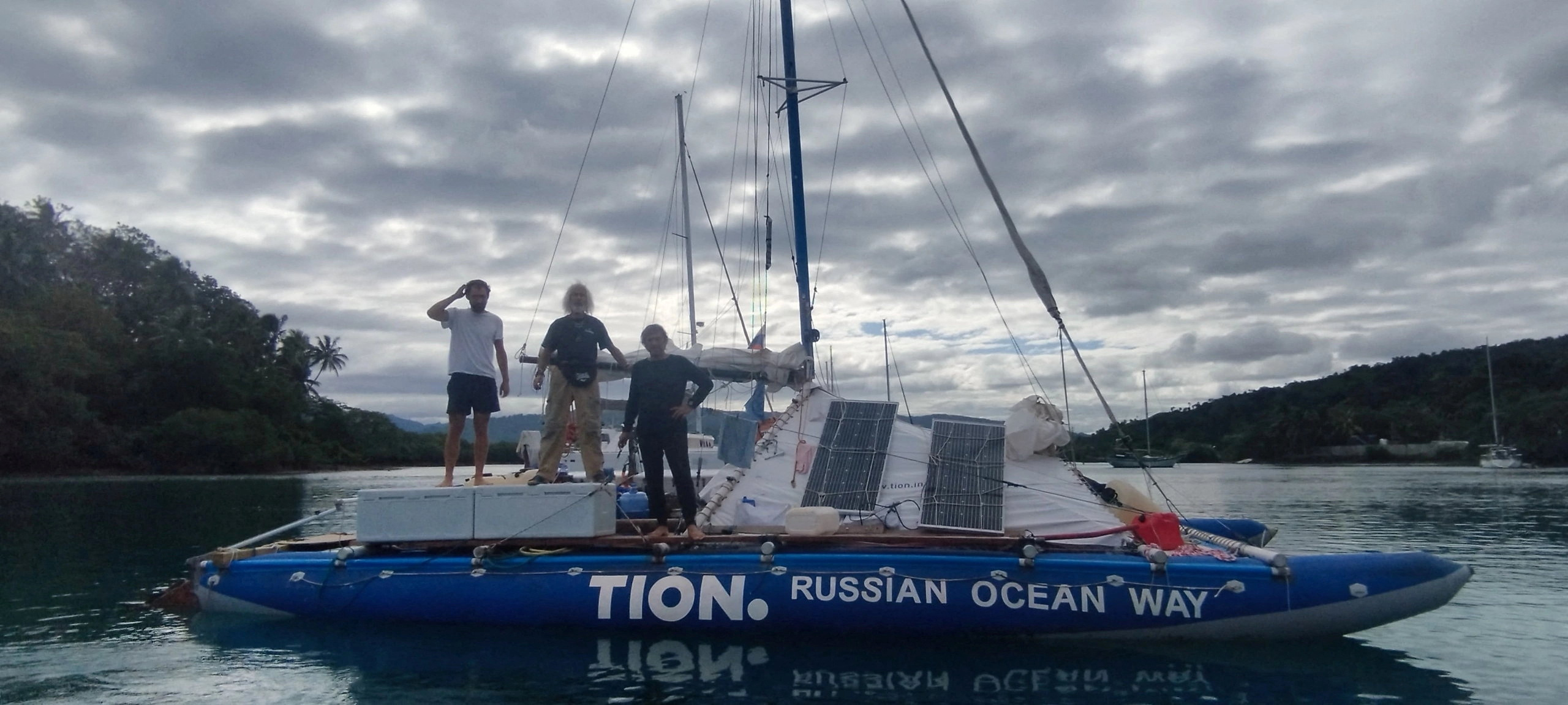
The Reuters Daily Briefing newsletter provides all the news you need to start your day. Sign up here.
Reporting by Renju Jose in Sydney, additional reporting by Wang Jiawei and Mahezabin Sayed; Writing by Alasdair Pal; Editing by Michael Perry
Our Standards: The Thomson Reuters Trust Principles. , opens new tab

Explainer: Why is Russia changing its language about the war?
The Kremlin said on Friday that what it has described for more than two years as its "special military operation" in Ukraine had become a war because of the involvement of the West.

World News | Fierce little cookiecutter sharks behind the…
Share this:.
- Click to share on Facebook (Opens in new window)
- Click to share on Twitter (Opens in new window)
- Click to print (Opens in new window)
- Click to email a link to a friend (Opens in new window)
- Click to share on Reddit (Opens in new window)
Today's e-Edition
- Latest News
- Environment
- Transportation
Breaking News
World news | catherine, princess of wales, announces she has cancer, world news | fierce little cookiecutter sharks behind the dramatic sinking of a boat at sea.

The dramatic ocean saga that led to three men being rescued this week from a sinking inflatable catamaran off the Australian coast has been pinned on an unusual culprit: a footlong shark that leaves such perfectly round wounds it’s called the cookiecutter.
The sailors, two Russians and one French national, were pulled from the sea on Wednesday on their way to the northeastern Australian city of Cairns from the remote Pacific nation Vanuatu, authorities said.
In an Instagram post after the rescue, the group said the attacks were by cookiecutter sharks, which damaged the rear left balloon of the boat on Monday and left it “completely submerged underwater.” The group lasted another day – until the cookiecutters attacked again late Tuesday, this time biting through the right balloon.
The attacks left their inflatable boat partly sunken, prompting them to issue a distress call to nearby vessels in the early hours of Wednesday. The crew and their belongings were rescued by cargo ship the Dugong Ace, and the sinking catamaran was abandoned in the ocean, the Instagram post said.
“They hunt inflatable boats, and (our vessel) just had many many holes and started to go down,” one of the sailors, Evgeny Kovalevskiy, told CNN affiliate Nine News in a video after the rescue.
The crew was attempting to become the first to circumnavigate the world on an inflatable boat and they’d assess how to continue that journey after arriving in Brisbane later Thursday, Kovalevskiy added.
Unlike great whites or hammerheads, cookiecutter sharks are not usually associated with attacks in the open ocean. The cookiecutter — also known as the cigar shark, for its tubular shape — is barely 18 inches long but it has an appetite for large prey – usually targeting seals, whales and dolphins, according to the Florida Museum of Natural History .
Its unique feeding method is how it got its name. First, the shark entices prey with its glowing underside, which can deceptively look like small fish in the deep ocean. When the prey is close, the shark then uses its sucking lips and sharp upper teeth to attach itself to the larger animal. Then, it spins its body around – using its larger serrated bottom teeth to cut a cookie-shaped chunk of flesh, leaving a circular wound in the prey’s body, according to the museum.
Even submarines have come under attack before, with round chunks torn off their sonar domes.
The museum added that because of its size and deep water habits, the cookiecutter is not considered a threat to humans. Cookiecutter sharks have only been involved in four confirmed, unprovoked bites, which all happened in Hawaii, it said, citing the International Shark Attack File.
The Australian Maritime Safety Authority (AMSA) said in a statement Wednesday that “a large section” of the inflatable vessel’s hull was missing when it was found.
“There’s many reasons that vessels are attacked by sharks. However, the motivations of these sharks is unclear,” said AMSA duty manager Joe Zeller.
The catamaran’s crew “were very happy to be rescued and they are all healthy and well,” he added.
The-CNN-Wire ™ & © 2023 Cable News Network, Inc., a Warner Bros. Discovery Company. All rights reserved.
- Report an error
- Policies and Standards
More in World News

World News | At least 40 dead in attack on concert hall near Moscow

Health | Video: Catherine, the Princess of Wales, reveals the ‘huge shock’ of her cancer diagnosis

SUBSCRIBER ONLY
World news | driving to mexico make sure you have the right car insurance.

World News | Record Russian missile barrage disrupts Ukraine power system
- SYDNEY, NSW
- MELBOURNE, VIC
- HOBART, TAS
- BRISBANE, QLD
- ADELAIDE, SA
- CANBERRA, ACT
Three rescued from shark-bitten catamaran in Coral Sea

- Great Barrier Reef
- Link in bio
Send your stories to [email protected]
Property News: This daring Seaforth property is an engineering marvel.
Top Stories

Princess of Wales undergoing chemotherapy for cancer

Record-breaking comet reaches its closest approach to Earth

WATCH: Kate statement in full

Organisers accused of falsely promoting Bill Shorten's attendance at event
3 people had to be rescued from their 30-foot inflatable catamaran after sharks attacked the boat, officials say
- Three people were rescued from their inflatable vessel after sharks attacked its hull, officials said.
- The trio were around 510 miles off Australia's northeastern coast, according to rescue authorities.
- When found, the 30-foot catamaran was missing large portions of its hull, rescuers reported.

Three men on board an inflatable catamaran were rescued off Australia's northeastern coast on Wednesday after their vessel was attacked several times by sharks.
The trio — two Russians and one French citizen — were about 510 miles from shore when Australian authorities picked up their distress alert in the early morning, the Australian Maritime Safety Authority said in a statement.
The Russian vessel had departed from the Pacific archipelago of Vanuatu and was heading to the city of Cairns in Queensland, the AMSA said.
Both hulls of their 30-foot catamaran "have been damaged following several shark attacks," authorities added.
Officials said they asked a nearby Panama-flagged ship, the Dugong Ace, to help rescue the three people. A Challenger rescue aircraft was also sent to assist from Cairns.
Related stories
When found, the catamaran had "large sections of its hull missing," AMSA Response Centre manager Joe Zeller said.
"There's many reasons that vessels are attacked by sharks. However, the motivations of these sharks is unclear," Zeller said.
Footage shot by a Challenger rescue plane shows the state of the vessel when rescuers arrived.
—Matthew Loh (@ma2loh) September 6, 2023
The three sailors are aged between 28 and 64, in healthy condition, and on board the Dugong Ace on their way to Brisbane, Zeller said. Their full trip would likely have taken between two to three weeks, he said.
"The emergency beacon absolutely saved their lives," Zeller added. "It enabled the rescue coordination center to identify their precise location and empower the most appropriate and quickest response to rescue them."
The trio are expected to arrive in Brisbane on Thursday, the AMSA said in its statement.
Sharks and orcas have been making headlines this summer amid a rising number of reports documenting attacks on vessels . But it's still unclear what causes these encounters , or if they are related at all.
Watch: Deep-sea explorers discovered creatures at the bottom of the ocean feasting on decaying whales
- Main content
The Straits Times
- International
- Print Edition
- news with benefits
- SPH Rewards
- STClassifieds
- Berita Harian
- Hardwarezone
- Shin Min Daily News
- SRX Property
- Tamil Murasu
- The Business Times
- The New Paper
- Lianhe Zaobao
- Advertise with us
Sailors plucked from shark-bitten inflatable catamaran off Australia
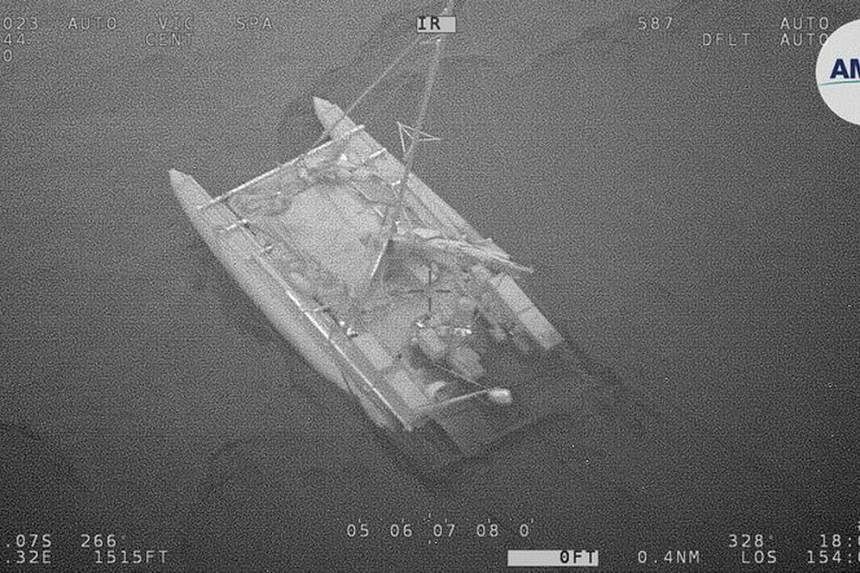
SYDNEY - Three men were plucked to safety on Wednesday after sharks started tearing chunks from their inflatable catamaran as they attempted to sail to Australia.
The men – two Russians and a French citizen – were picked up by a cargo ship while floating in the shark-filled Coral Sea some 800km south-east of Cairns.
“Both hulls of the vessel have been damaged following several shark attacks,” the Australian Maritime Safety Authority said in a statement.
The authority said the trio had planned to sail from the Pacific archipelago of Vanuatu to the city of Cairns in tropical northern Australia, a distance of more than 2,000km.
They activated an emergency distress beacon in the early hours of Wednesday morning.
Footage shot by a rescue helicopter shows the catamaran bobbing in calm seas as it is approached by the hulking Dugong Ace, a vehicle transporter that came to the sailors’ aid.
The Coral Sea is brimming with reef sharks and other apex species such as tuna and marlin.
The Russian Geographic Society said the trio were part of a round-the-world expedition which started from St Petersburg on July 1, 2021, ABC News reported.
A spokesman said the catamaran was attacked by cookiecutter sharks, a small species of the shark family that does not grow beyond 50cm.
According to ocean conservation organisation Oceana, the cookiecutter shark is a parasite. It feeds off larger animals without killing them by using its sharp teeth to latch on to the skin of an animal and scoop out the flesh or blubber to feed.
According to the Australian government, the Coral Sea is home to more sharks “than almost any other survey site in the world”. AFP
Join ST's Telegram channel and get the latest breaking news delivered to you.
Read 3 articles and stand to win rewards
Spin the wheel now
- Middle East
- Global development
Three rescued after shark attacks on yacht off Australian coast – video
Three people have been rescued in the Coral Sea off the coast of Cairns , after their catamaran was damaged during several shark attacks.
The Australian Maritime Safety Authority (Amsa) coordinated the rescue early on Wednesday morning roughly 520 miles (835km) off the coast of Cairns, Queensland, after receiving a distress beacon.
The crew, who were on a round-the-world expedition called Russian Ocean Way, which they were documenting online , wrote in a post that they were first attacked by sharks on 4 September and again the following day when the catamaran began to sink
Three people rescued off Australian coast after yacht damaged by multiple shark attacks
Wed 6 Sep 2023 08.32 BST Last modified on Thu 7 Sep 2023 11.09 BST
- Share on Facebook
- Share on Twitter
- Share via Email
- Australia news
Most popular
- Sustainability
- Latest News
- News Reports
- Documentaries & Shows
- TV Schedule
- CNA938 Live
- Radio Schedule
- Singapore Parliament
- Mental Health
- Interactives
- Entertainment
- Style & Beauty
- Experiences
- Remarkable Living
- Send us a news tip
- Events & Partnerships
- Business Blueprint
- Health Matters
- The Asian Traveller
Trending Topics
Follow our news, recent searches, three rescued from shark-bitten inflatable catamaran off australia after setting sail from vanuatu, advertisement.
The trio are unharmed, says a spokesperson for the voyage, which is aimed at promoting Russia and Siberia.
A view shows the boat that carried three people who were rescued from the Coral Sea. (Photo: Reuters/Australian Maritime Safety Authority/Handout)
SYDNEY: Three men were plucked to safety on Wednesday (Sep 6) after sharks started tearing chunks from their inflatable catamaran as they attempted to sail to Australia from Vanuatu - a distance of more than 2,000km.
The men - two Russians and a French citizen - were picked up by a cargo ship while floating in the shark-filled Coral Sea.
"Both hulls of the vessel have been damaged following several shark attacks," the Australian Maritime Safety Authority (AMSA) said in a statement.
The authority said the trio had planned to sail from the Pacific archipelago of Vanuatu to the city of Cairns in tropical northern Australia.
They activated an emergency distress beacon - registered to the Tion, a 9m inflatable catamaran - in the early hours of Wednesday morning.
AMSA requested the assistance of a Panama-flagged vehicle carrier, which successfully conducted the rescue. The boat was located about 800km southeast of Cairns in the Coral Sea.
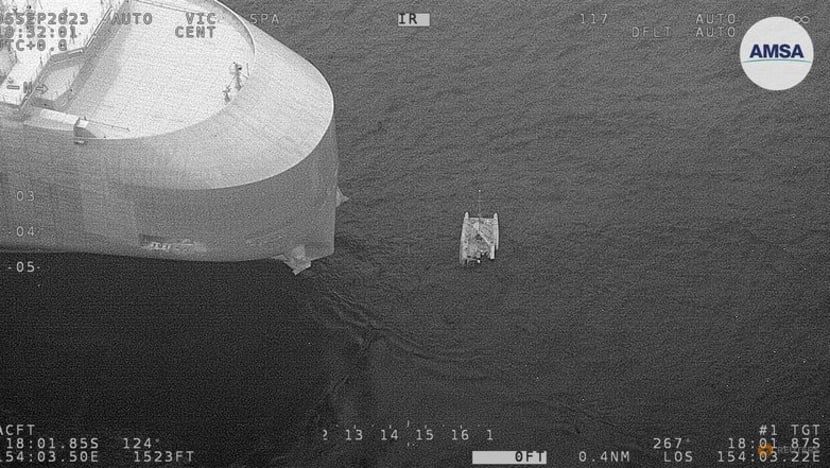
Footage shot by a rescue helicopter shows the catamaran bobbing in calm seas as it is approached by the hulking Dugong Ace, a vehicle transporter that came to the sailors' aid.
The Coral Sea is brimming with reef sharks and other apex species such as tuna and marlin.
According to the Australian government, it is home to more sharks "than almost any other survey site in the world".
The three passengers are due to arrive in Brisbane on Thursday, AMSA said.
The men were unharmed, said Anna Kosikhina, a spokesperson for the voyage, which she said was aimed at promoting Russia and Siberia and began two years ago.
"They were all intact. Nobody is hurt," she said.
"The only thing is that the balloons of the inflatable catamaran were blown away."
This was not the first accident on the voyage, Kosikhina said, with the steering device of a previous vessel failing during a previous leg from Chile to Easter Island.
The crew continued the expedition on an inflatable catamaran by the same manufacturer that had been stored on the island for several years.
Related Topics
Also worth reading, this browser is no longer supported.
We know it's a hassle to switch browsers but we want your experience with CNA to be fast, secure and the best it can possibly be.
To continue, upgrade to a supported browser or, for the finest experience, download the mobile app.
Upgraded but still having issues? Contact us
World News | Small sharks sank an inflatable catamaran off…
Share this:.
- Click to share on Facebook (Opens in new window)
- Click to share on Twitter (Opens in new window)
- Click to share on Reddit (Opens in new window)
- Click to print (Opens in new window)
- Investigative Reporting
- Environment
World News | Small sharks with serrated teeth and sucking lips sank an inflatable catamaran off Australian coast
The crew was attempting to become the first to circumnavigate the world on an inflatable boat.

The dramatic ocean saga that led to three men being rescued this week from a sinking inflatable catamaran off the Australian coast has been pinned on an unusual culprit: a small, cigar-shaped shark that leaves such perfectly round wounds it’s called the cookiecutter.
The sailors, two Russians and one French national, were pulled from the sea on Wednesday on their way to the northeastern Australian city of Cairns from the remote Pacific nation Vanuatu, authorities said.
Also see: How to survive a shark attack — or better yet, avoid one entirely
In an Instagram post after the rescue, the group said the attacks were by cookiecutter sharks, which damaged the rear left balloon of the boat on Monday and left it “completely submerged underwater.” The group lasted another day – until the cookiecutters attacked again late Tuesday, this time biting through the right balloon.
The attacks left their inflatable boat partly sunken – prompting them to issue a distress call to nearby vessels in the early hours of Wednesday. The crew and their belongings were rescued by cargo ship the Dugong Ace – but the sinking catamaran was abandoned in the ocean, the Instagram post said.
“They hunt inflatable boats, and (our vessel) just had many many holes and started to go down,” one of the sailors, Evgeny Kovalevskiy, told CNN affiliate Nine News in a video after the rescue.
Also see: California swimmer describes her shark attack
The crew was attempting to become the first to circumnavigate the world on an inflatable boat and they’d assess how to continue that journey after arriving in Brisbane later Thursday, Kovalevskiy added.
Unlike great whites or hammerheads, cookiecutter sharks are not usually associated with attacks in the open ocean. The cookiecutter, also known as the cigar shark, is more than 10 times smaller than a great white, measuring between 1 to 1.4 feet (0.3 to 0.42 meters) on average.
Despite its small size, the cookiecutter ( Isistius brasiliensis ) has an appetite for large prey – usually targeting seals, whales and dolphins, according to the Florida Museum of Natural History .
Also see: How often are sharks near surfers, swimmers?
Its unique feeding method is how it got its name: first, the shark entices prey with its glowing underside, which can deceptively look like small fish in the deep ocean.
Even submarines have come under attack before, with round chunks torn off their sonar domes.
The museum added that because of its size and deep water habits, the cookiecutter is not considered a threat to humans. Cookiecutter sharks have only been involved in four confirmed, unprovoked bites, which all happened in Hawaii, it said, citing the International Shark Attack File.
The Australian Maritime Safety Authority (AMSA) said in a statement Wednesday that “a large section” of the inflatable vessel’s hull was missing when it was found.
“There’s many reasons that vessels are attacked by sharks. However, the motivations of these sharks is unclear,” said AMSA duty manager Joe Zeller.
The catamaran’s crew “were very happy to be rescued and they are all healthy and well,” he added.
The-CNN-Wire™ & © 2023 Cable News Network, Inc., a Warner Bros. Discovery Company. All rights reserved.
- Newsroom Guidelines
- Report an Error
More in World News

World News | Kremlin says 40 killed and more than 100 wounded in attack on Moscow concert hall

World News | Kate, the reliable face of a modern monarchy, now faces a personal battle in the public eye

Video: Catherine, the Princess of Wales, reveals the ‘huge shock’ of her cancer diagnosis

World News | Kate, Princess of Wales, says she has cancer and is undergoing chemotherapy
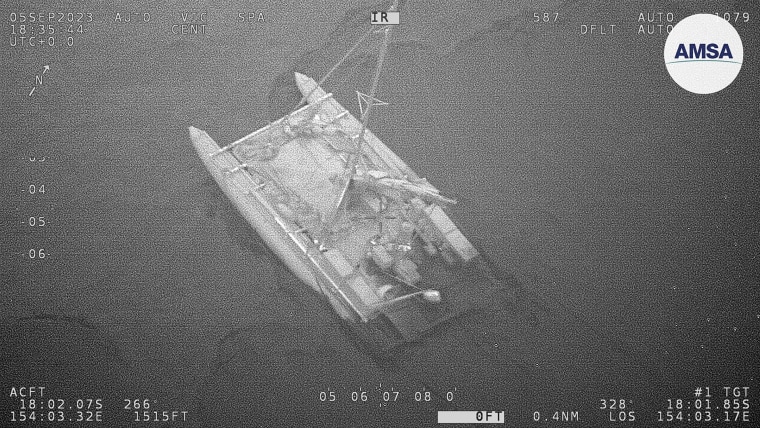
Dozens of casualties reported after attack on Russian concert hall

Video shows fire at scene of reported Moscow shooting attack

Special report: Princess Kate announces she is undergoing treatment for cancer

Watch: Kate Middleton says she is being treated for cancer in video announcement

Funeral for Rafah children sparks anger and frustration in one of the mourners

Russia attacks Ukrainian electrical power supply including major hydroelectric plant

Some Americans make it out of Haiti after weeks of turmoil


U.S. introduces Gaza cease-fire resolution at U.N.

Video captures sound of gunfire inside Al Shifa Hospital

‘We don't have any place to live’: Dr. Harara and his family trapped in Rafah

Gangs in Haiti target communities in new attacks

Displaced families in Gaza's Jabaliya camp talk of a Ramadan like no other
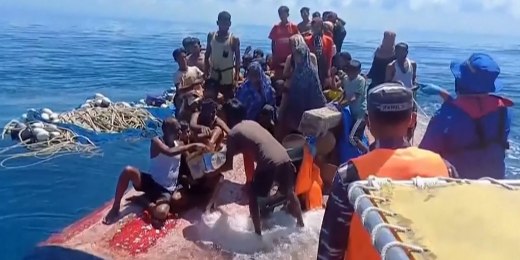
Rohingya Muslim refugees rescued from capsized wooden boat off Indonesia

Kyiv comes under Russian bombardment from ballistic and cruise missiles

U.S. submits draft U.N. resolution calling for immediate Gaza cease-fire and hostage release

Hospital staffers reportedly investigated for alleged breach of Princess Kate's medical records
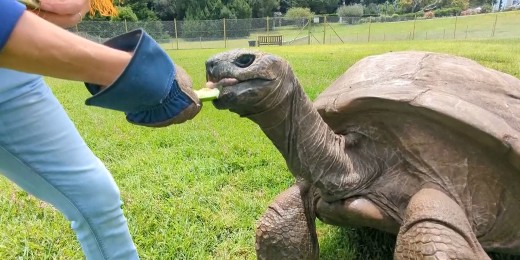
Meet Jonathan, the oldest tortoise in the world

Gazan civilians flee fighting as IDF hits Al-Shifa Hospital

Irish prime minister makes surprise resignation announcement

Dodgers and Padres play in MLB opener in Seoul amid security scare
3 sailors rescued from inflatable catamaran after shark attack.
Three sailors on an around-the-world journey were rescued from a sinking inflatable catamaran after it came under repeated attack by sharks more than 500 miles off the Australian coast. Sept. 6, 2023
Best of NBC News

NBC News NOW

What Princess Kate's cancer diagnosis means for the royal family

Buckingham Palace issues plea for privacy as Princess Kate treated for cancer

SharkBite Wiki
Please read the Rules BEFORE contributing to this wiki!

- View history
- 1 Description
Description
Featuring two parallel hulls the signature feature of catamarans this makes this boat near impossible to flip with its wide base. The boat sports a sail and a total of 7 seats all with an open rear allowing for heavy fire on the shark whenever it is in pursuit. This vessel has high durability and surprisingly good speed. This ship has stairs at the rear for easy access.
Pros and Cons
- Decent speed allow it to escape sharks if well-maneuvered
- Decent handling combined with the speed makes evading the shark surprisingly easy
- High durability allows this boat to survive an attack and still function
- When destroyed it leaves a lot of debris making it hard for the shark find the players
- The seats in the ship are angled outwards which allows all the players to get a good firing position without blocking the other players guns.
- Incredibly stable, never bounces on the water and never tilts when turning due to its double hull and wide area, making shooting and driving very smooth.
- Near impossible to capsize good amount of seats large platform for people to stand on even if the seats are full
- Very cheap.
- When destroyed by the shark, the player can find the roof of the cockpit and stand on it. Unlike other broken parts of boats, it does not wobble easily and you can hide on it, because of the sail.
- Speed slow compared to other larger vessels excluding the Yacht.
- The sails and large size of this boat makes it highly visible compared to other smaller boats.
- 1 SharkBite 2
- 2 Hydro Tank
- 3 Stealth Boat
Video shows great white shark off Sarasota coast check out boat near whale carcass
The death of sperm whale that had beached itself on a sandbar off Venice Beach, Florida March 10 led to an interesting great white shark encounter with a boat a week later.
After a necropsy was completed on the 44-foot, 70,000-pound whale, its remains were towed at least 10 miles off the Sarasota County coast.
Great white sharks are opportunistic eaters, whose diet consists of fish, invertebrates, and marine mammals, according to NOAA Fisheries . That includes occasionally scavenging a dead whale.
Such was the case when boaters near the whale carcass came face-to-face with a great white shark that headbutted a camera and investigated the boat's motor before swimming over to the whale carcass and tearing into it.
According to WFLA , the encounter was captured on video by Brian Jung on March 17, who told the news outlet, “We located the carcass and there were three great white sharks eating off the blubber on the whale.”
Other great white sharks surfaced off Sarasota coast
Several sharks , tracked by the research group OCEARCH , have pinged off Sarasota's coast recently.
On March 5, a 10-foot 5-inch, 600-pound white shark nicknamed Rose , pinged in Sarasota waters.
Penny , a 10-foot 3-inch, 522-pound white shark pinged near Sarasota on Jan. 11 .
Do great white sharks swim around Florida?
Yes. Great white sharks migrate south, including Florida , when the water gets cold and food sources become scarce up north, according to OCEARCH chief scientist Dr. Bob Hueter .
Think of them as the snowbirds of sharks.
Most of them tend to stay away from the beaches in continental shelf waters, Hueter said.
Most shark attacks happen in Florida
There were 69 documented unprovoked shark attacks around the globe in 2023. The U.S. led the world with 36 attacks and Florida again was the state with the most bites at 16.
Florida shark attacks by county:
- Volusia County: 8
- Brevard County : 2
- St. Lucie County : 2
- Miami-Dade County: 1
- Palm Beach County : 1
- Escambia County : 1
- Pinellas County: 1
While the U.S. has the most attacks, South Africa has the most shark-related fatalities.
Great white shark facts
Here are some things to know about white sharks, according to NOAA Fisheries :
- White sharks grow slowly. Males mature at around 26 years old and females at around 33 years old. Life expectancy is difficult to determine but is estimated to be between 30 and 70 years.
- White sharks are about 4 feet long at birth but can grow up to about 20 feet long and weigh over 4,000 pounds.
- White sharks are partially warm-blooded and can maintain their internal body temperature above that of the surrounding water. This allows them to be more active in cooler waters than cold-blooded species.
share this!
March 15, 2024
This article has been reviewed according to Science X's editorial process and policies . Editors have highlighted the following attributes while ensuring the content's credibility:
fact-checked
trusted source
Shark-bitten orcas in the Northeastern Pacific could be a new population of killer whale
by University of British Columbia
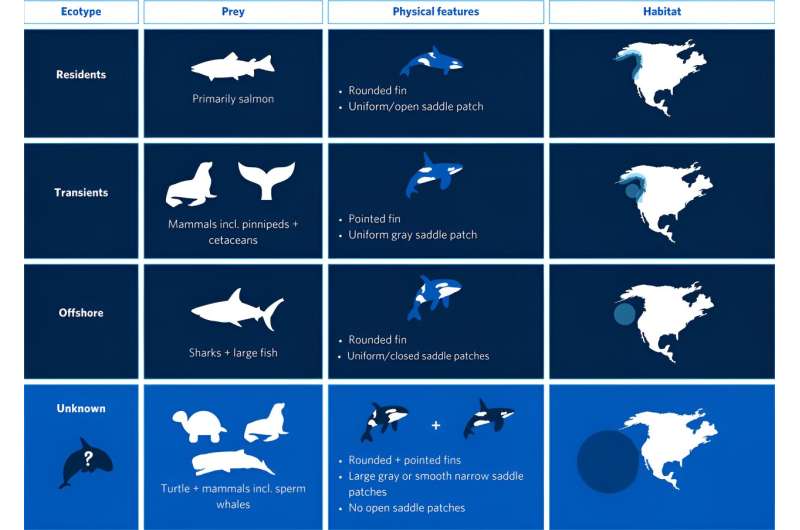
UBC researchers believe a group of killer whales observed hunting marine mammals including sperm whales, as well as a sea turtle, in the open ocean off California and Oregon could be a new population.
Based on available evidence, the researchers posit in a new study published in Aquatic Mammals that the 49 orcas could belong to a subpopulation of transient killer whales or a unique oceanic population found in waters off the coast of California and Oregon.
"The open ocean is the largest habitat on our planet, and observations of killer whales in the high seas are rare," said first author Josh McInnes, a master's student at the UBC Institute for the Oceans and Fisheries (IOF). "In this case, we're beginning to get a sense of killer whale movements in the open ocean and how their ecology and behavior differs from populations inhabiting coastal areas."
Three ecotypes of killer whales live along the coasts of California and Oregon: 'residents,' 'transients,' and 'offshores'.
The unknown orcas have been spotted before, but the new paper contains a weight of evidence gathered from nine encounters with 49 animals from 1997 to 2021, enough to form a solid hypothesis, the researchers said.
"It's pretty unique to find a new population. It takes a long time to gather photos and observations to recognize that there's something different about these killer whales," said co-author Dr. Andrew Trites, IOF professor.
The 49 killer whales could not be matched with any known animals through photos or descriptions. "In one of the first encounters researchers had with a pod of these oceanic killer whales, they were observed taking on a herd of nine adult female sperm whales , eventually making off with one. It is the first time killer whales have been reported to attack sperm whales on the West Coast," said McInnes.
"Other encounters include an attack on a pygmy sperm whale, predation on a northern elephant seal and Risso's dolphin, and what appeared to be a post-meal lull after scavenging a leatherback turtle."
Shark scars provide vital clues
A key clue to the new population's presumed habitat range lies in cookie-cutter shark bite scars observed on almost all of the orcas. This parasitic shark lives in the open ocean, meaning the new population primarily inhabits deep waters far from land.
The orcas also feature physical differences from the three main ecotypes, including in their dorsal fins and saddle patches—the gray or white patches by the fin.
"While the sizes and shapes of the dorsal fins and saddle patches are similar to transient and offshore ecotypes, the shape of their fins varied, from pointed-like transients to rounded-like offshore killer whales," said McInnes. "Their saddle patch patterns also differed, with some having large uniformly gray saddle patches and others having smooth narrow saddle patches similar to those seen in killer whales in tropical regions."
Along with marine mammal stock assessment surveys, fishermen and passengers on an open-ocean birding expedition and whale-watching tour also provided observations of the unidentified killer whales, said Dr. Trites. Spotting the new population has become something of a hobby among fishermen, some of whom have bought cameras for their trips specifically to snap an encounter, the researchers said.
The researchers hope to document more sightings and gather more information, including acoustic data about the orcas' calls and genetic information from DNA samples to investigate further how these killer whales may differ, or not, from already documented populations.
Provided by University of British Columbia
Explore further
Feedback to editors

Research uncovers a rare resin fossil find: A spider that aspires to be an ant
6 minutes ago

Using physics principles to understand how cells self-sort in development

Astronomers find evidence that blue supergiant stars can be formed by the merger of two stars

Water persisted in Mars' Gale crater for longer than previously thought, study finds
2 hours ago

Tudor era horse cemetery in Westminster revealed as likely resting place for elite imported animals

Scientists explore complex pattern of tipping points in the Atlantic's current system

Signs of life detectable in single ice grain emitted from extraterrestrial moons, experimental setup shows

Study reports enormous ice loss from Greenland glacier

In Lake Erie, climate change scrambles zooplankton's seasonal presence

Researchers develop affordable, user-friendly method for single-cell reactions at the nanoliter level
3 hours ago
Relevant PhysicsForums posts
Are all biological catabolic reactions exergonic.
Mar 20, 2024
A First of Its Kind: A Calcium-based signal in the Human Brain
Mar 18, 2024
Biological culture and cultural biology
Mar 17, 2024
Potentially fatal dog parasite found in the Colorado River
Mar 15, 2024
Electrical potential difference and charge separation
Mar 14, 2024
Nick Lanes on Sean Carroll's podcast
Mar 11, 2024
More from Biology and Medical
Related Stories

In unusual orca sighting, tour spots at least 20 killer whales off San Francisco
Jun 8, 2023

A pod of killer whales trapped in drift ice off northern Japan has apparently safely escaped
Feb 7, 2024

Biologist: Orca attacks on gray whales up in California bay
Apr 30, 2017

Study shows links between Australia's false killer whales and endangered groups from Hawaii
Mar 16, 2023

Killer whales lingering in newly melted arctic ocean
Dec 3, 2021

2018–2022 Southern Resident killer whale presence in the Salish Sea: continued shifts in habitat usage
Jul 13, 2023
Recommended for you

Your dog understands that some words 'stand for' objects, new study shows
5 hours ago

Decommissioned offshore structures could offer only limited ecological benefits, analysis of studies suggests
10 hours ago

Research unravels the enigma of curly birch and suggests marker to recognize it at the sprout stage

Bees need food up to a month earlier than provided by recommended pollinator plants, study reveals
6 hours ago

New research shows unintended harms of organic farming
Mar 21, 2024
Let us know if there is a problem with our content
Use this form if you have come across a typo, inaccuracy or would like to send an edit request for the content on this page. For general inquiries, please use our contact form . For general feedback, use the public comments section below (please adhere to guidelines ).
Please select the most appropriate category to facilitate processing of your request
Thank you for taking time to provide your feedback to the editors.
Your feedback is important to us. However, we do not guarantee individual replies due to the high volume of messages.
E-mail the story
Your email address is used only to let the recipient know who sent the email. Neither your address nor the recipient's address will be used for any other purpose. The information you enter will appear in your e-mail message and is not retained by Phys.org in any form.
Newsletter sign up
Get weekly and/or daily updates delivered to your inbox. You can unsubscribe at any time and we'll never share your details to third parties.
More information Privacy policy
Donate and enjoy an ad-free experience
We keep our content available to everyone. Consider supporting Science X's mission by getting a premium account.
E-mail newsletter

IMAGES
COMMENTS
The first reported cookiecutter shark attack was in Hawaii in 2011, when the victim was swimming in deep water late at night. The most recent attack was on a 7-year-old boy on Magnetic Island in 2017.
Sept. 7, 2023, 6:14 AM PDT / Source: The Associated Press. By The Associated Press. Three round-the-world sailors reached land safely Thursday after sharks nearly sank their catamaran in the Coral ...
3 men rescued after sharks repeatedly attacked their inflatable boat off Australia. The sailors, from Russia and France, were rescued from the sinking catamaran early Wednesday. Three sailors were ...
The dramatic ocean saga that led to three men being rescued this week from a sinking inflatable catamaran off the Australian coast has been pinned on an unusual culprit: a small, cigar-shaped ...
A school of 12-inch sharks were able to sink an inflatable 29-foot catamaran in the Coral Sea. Several small sharks about the size of a cigar are to blame for sinking a 29-foot catamaran this week ...
3 sailors rescued after boat attacked by sharks off Australian coast 00:18. Three sailors from Russia and France were rescued on Wednesday after the inflatable catamaran they were trying to ...
6 Sep 2023. Three men on board a catamaran off the northeastern coast of Australia have been rescued after sharks tore off sections from the hull of their inflatable vessel, according to officials ...
The teeth of the cookiecutter shark, the species which attacked a catamaran in the Coral Sea off the coast of Cairns. ... "They just take little bite-size morsels out of the side of them.
Repairs included repairing cookie-cutter shark bites, according to the Russian Geographical Society blog. "During the inspection of the catamaran, many bite marks of small 'cigar' sharks were found.
Shark damage to their catamaran forced three sailors to be rescued in the Coral Sea by container ship the Dugong Ace. ... Though they have taken bites out of people, no human is known to have died ...
Item 1 of 5 Vincent Thomas Etienne, Evgeny Kovalevsky and Stanislav Berezkin, the three people rescued after sharks attacked a yacht off the Australian coast, pose for a photo in Vanua Levu Island ...
The dramatic ocean saga that led to three men being rescued this week from a sinking inflatable catamaran off the Australian coast has been pinned on an unusual culprit: a footlong shark.
By Josh Hohne. A boat carrying three people was rescued from the Coral Sea 835 kilometres off the coast of Queensland in the dead of night after their rescue beacon was detected by the Australian ...
Australian Maritime Safety Authority. Three people were rescued from their inflatable vessel after sharks attacked its hull, officials said. The trio were around 510 miles off Australia's ...
A spokesman said the catamaran was attacked by cookiecutter sharks, a small species of the shark family that does not grow beyond 50cm. According to ocean conservation organisation Oceana, the ...
Three people have been rescued in the Coral Sea off the coast of Cairns, after their catamaran was damaged during several shark attacks. The Australian Maritime Safety Authority (Amsa) coordinated ...
Three sailors were rescued after a group of cookiecutter sharks attacked their inflatable catamaran several times over the course of two days off the coast of Australia. Rescued sailor Evgeny ...
Three rescued from shark-bitten inflatable catamaran off Australia after setting sail from Vanuatu The trio are unharmed, says a spokesperson for the voyage, which is aimed at promoting Russia and ...
Three sailors rescued from shark-bitten catamaran off Australia. Updated / Wednesday, 6 Sep 2023 09:03. The sailors were picked up by a cargo vessel. Three men were plucked to safety this morning ...
The cookiecutter shark, also known as the cigar shark, is more than 10 times smaller than a great white, measuring between 1 to 1.4 feet on average. ... unprovoked bites, which all happened in ...
3 sailors rescued from inflatable catamaran after shark attack. Three sailors on an around-the-world journey were rescued from a sinking inflatable catamaran after it came under repeated attack by ...
The man was able to swim to a catamaran, whose crew helped him out of the water, the release said. ... Worldwide, there were a total of 73 confirmed, unprovoked shark bites on people and 39 ...
The Catamaran is one of the better early boats available in the game, only costing 120 teeth with a decent speed and handling making it fairly good at running from sharks. Featuring two parallel hulls the signature feature of catamarans this makes this boat near impossible to flip with its wide base. The boat sports a sail and a total of 7 seats all with an open rear allowing for heavy fire on ...
The death of sperm whale that had beached itself on a sandbar off Venice Beach, Florida March 10 led to an interesting great white shark encounter with a boat a week later.. After a necropsy was ...
A key clue to the new population's presumed habitat range lies in cookie-cutter shark bite scars observed on almost all of the orcas. This parasitic shark lives in the open ocean, meaning the new ...